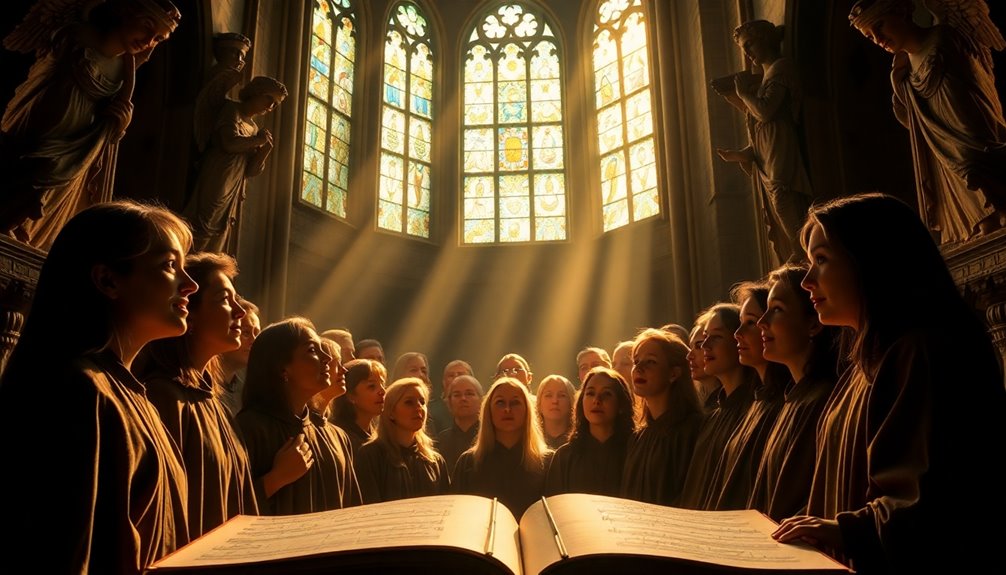"Hallelujah" translates to "praise ye Jah" in Hebrew and represents a powerful expression of joy and praise. You'll often find it in biblical texts, particularly the Book of Psalms, where it calls for worship and acknowledges God's goodness. While many see it as purely joyful, it also captures profound sorrow, reflecting life's complexities. Its use in medieval music further solidified its significance in communal worship. Beyond its origins, "Hallelujah" remains a versatile phrase, resonating in both religious and secular contexts. There's a deeper meaning behind this word that you might find intriguing.
Key Takeaways
- "Hallelujah" translates to "praise ye Jah," expressing a call to worship and joy in Hebrew.
- It appears frequently in the Book of Psalms, emphasizing God's goodness and the importance of praise.
- The term captures both joy and sorrow, reflecting the complexities of human experience and emotion.
- Its significance spans across cultures, evident in various musical interpretations and covers by numerous artists.
- "Hallelujah" is often used in religious contexts to foster unity and collective gratitude within congregations.
Introduction

Hallelujah's meaning resonates deeply across cultures and traditions, embodying a powerful expression of praise and joy. Derived from the Hebrew phrase הַלְלוּ יָהּ (hallū yāh), it translates to "praise ye Jah," where "Jah" refers to YHWH, the sacred name of God.
When you utter "Hallelujah," you're participating in a rich history that spans back to ancient texts, notably the Book of Psalms, where it appears 24 times as a call to worship.
In Christian traditions, "Hallelujah" takes on special significance, especially during festive occasions. You'll notice its absence during Lent, a period of reflection, highlighting its role as a celebratory term during joyful events like Easter.
The Greek form, ἀλληλούϊα (allēlouia), found in the Septuagint, emphasizes its importance in heavenly worship, particularly in Revelation.
Moreover, "Hallelujah" has transcended religious boundaries, making its way into popular culture, music, and literature. It's not just a word; it symbolizes joy, relief, and celebration.
Biblical Verses on Praise

When you explore the biblical verses on praise, you'll find that "Hallelujah" is woven throughout both the Old and New Testaments.
Key references in Psalms highlight its role in communal worship and joyous expression, while Revelation showcases its significance in celebrating God's reign.
Let's examine these primary and secondary Bible references to understand how "Hallelujah" enriches the act of praising God.
Primary Bible References
Throughout the Bible, you'll find "Hallelujah" woven into the fabric of worship, especially in the Book of Psalms. This word hallelujah appears prominently in Psalms 104–150, serving as a vibrant call to praise God.
For instance, Psalm 106:1 begins with, "Praise the Lord! Oh, give thanks to the Lord, for He's good!" This encapsulates the joyous spirit of hallelujah, urging believers to celebrate God's goodness.
In Psalm 150:6, you're reminded that "Let everything that has breath praise the Lord!" This powerful verse reinforces the essence of hallelujah, encouraging all creation to join in worship.
Interestingly, the New Testament also highlights the term in Revelation 19:6-7, where the heavenly hosts proclaim God's reign, further emphasizing the eternal nature of praise.
The Greek transliteration ἀλληλούϊα (allēlouia) in the Septuagint connects the concept of praise across languages and traditions, showcasing its universal appeal.
Additionally, the word hallelujah plays a crucial role in Christian liturgical practices, often being set aside during Lent to reflect a solemn period before the joyous Easter celebration.
Secondary Bible References
The call to praise found in "Hallelujah" resonates deeply in various biblical verses, extending beyond the Book of Psalms. You'll notice that "Hallelujah" appears prominently in verses like Psalm 146:1 and Psalm 150:1, where it serves as a heartfelt invitation to worship and praise God. These verses beautifully express joy and gratitude, inviting you to join in the celebration of the Lord's goodness.
Moreover, Revelation 19:1-6 showcases "Hallelujah" in a powerful context, celebrating God's reign and His ultimate victory over evil. This echoes throughout scripture, reinforcing the idea that praise is a vital aspect of your spiritual journey.
In Psalm 100:4, you're encouraged to enter God's presence with thanksgiving and praise, while Psalm 113:1 calls for praise from all servants of the Lord.
The Greek transliteration "Alleluia" further connects these themes in both Jewish and Christian texts, highlighting the continuity of worship across traditions.
Ultimately, the use of "Hallelujah" encapsulates a spirit of joy, reverence, and gratitude, reminding you of the importance of praising God in all aspects of life.
Medieval Religious Music Influence

Medieval religious music's profound influence on the use of "Hallelujah" can't be overstated. During this era, "Hallelujah" became a common refrain in liturgical chants and hymns, emphasizing the praise and worship of God in services.
You'll find that the term was often woven into Gregorian chant, which thrived in medieval times, highlighting the melodic and rhythmic expression of devotion. Composers like Hildegard of Bingen showcased "Hallelujah" in their works, underscoring its significance in both vocal and instrumental religious music.
The integration of "Hallelujah" in medieval music didn't just serve a purpose; it set the foundation for its later prominence in the Renaissance. There, it evolved into a central theme in polyphonic compositions and choral works, expanding its reach and impact.
What's remarkable is that the medieval tradition of "Hallelujah" has persisted through the centuries, influencing contemporary worship music. Today, you'll notice its enduring presence in modern hymns, which continue to celebrate the joyful meaning of "Hallelujah."
This rich history demonstrates how deeply rooted the term is in the musical expression of faith and praise.
Historical Context of Usage

In examining the historical context of "Hallelujah," you'll find its roots in Hebrew, where it serves as a powerful call to praise God. This term appears frequently in the Book of Psalms, with 24 instances highlighting its significance in ancient worship practices.
During the Second Temple period, the pronunciation of YHWH ceased, making "Hallelujah" a prominent expression of praise within Jewish liturgy. This tradition carried over into various Christian practices, where its use varies; for instance, it's often omitted during Lent, emphasizing its association with joy and celebration in the context of resurrection and victory.
Historically, "Hallelujah" acted as a communal expression of faith, connecting congregations through its repetitive use in worship and celebrations over the ages. Its influence transcends religious boundaries, evolving from scriptural origins to become a widely recognized expression of joy in contemporary music and popular culture.
Today, when you hear "Hallelujah," it not only evokes feelings of praise but also serves as a reminder of its rich history and the deep sense of community it fosters among believers throughout time.
Misunderstood as a Joyful Chant

You might think of "Hallelujah" as just a joyful chant, but that view misses its deeper emotional layers.
Many people overlook how this term captures both praise and sorrow, reflecting the complexities of human experience.
Address Common Misconceptions
Many people mistakenly view "Hallelujah" as a purely joyful chant, overlooking its rich emotional depth. While it's often celebrated in happy contexts, its origins in Hebrew reveal a duality that encompasses both praise and lamentation.
Leonard Cohen's interpretation of "Hallelujah" demonstrates this complexity, intertwining themes of faith, doubt, and pain. His version shows that the word can express deep emotional struggles, rather than just unbridled joy.
When "Hallelujah" is used in popular culture, its emotional weight often reflects human vulnerability and existential reflection.
Unfortunately, many examples don't represent the full spectrum of its meaning. This misunderstanding can lead to a superficial view of the term, ignoring its historical roots in scripture, particularly in the Book of Psalms, where it appears alongside moments of profound sorrow.
Misinterpretation of Emotional Intent
Misunderstanding the emotional intent behind "Hallelujah" often leads to its oversimplification as merely a joyful chant. Leonard Cohen's "Hallelujah" isn't just a celebration; it reflects a complex blend of joy and sorrow, capturing the duality of human experience.
While many hear it as an uplifting tune, the lyrics delve into themes of love, loss, and spiritual struggle, challenging you to look beyond the surface.
Take the phrase "cold and broken Hallelujah." This line illustrates the depth of emotional resonance in the song, highlighting pain alongside praise. It's a reminder that life isn't always cheerful, and that's where the song's true power lies.
It resonates differently with listeners, making it applicable in both secular and religious contexts.
Covers by artists like Jeff Buckley further emphasize this complexity. His rendition shifts the tone from celebration to lamentation, showcasing that "Hallelujah" carries a weight that transcends mere joy.
Daily Expressions of Gratitude

Incorporating daily gratitude practices, like journaling or sharing thanks with others, can transform your perspective on life.
Whether you take a moment to reflect on what you're grateful for or engage in congregational singing, these acts foster connection and positivity.
Daily Gratitude Journaling Practice
Daily gratitude journaling is a powerful practice that can transform your mindset and enhance your overall well-being. By writing down at least three things you're grateful for each day, you actively engage in gratitude journaling, which means praise for the positives in your life.
Research shows that regular expressions of gratitude can boost happiness levels by 25%, making it a simple yet effective tool for improving your mental health. This practice not only lifts your spirits but also helps reduce symptoms of depression and anxiety.
Each journal entry creates a tangible record of joyful moments, allowing you to revisit them during tougher times. Additionally, daily gratitude journaling encourages mindfulness, prompting you to focus on the present and appreciate the small blessings that often go unnoticed.
Moreover, acknowledging what you're thankful for can strengthen your relationships. When you express appreciation for others, it fosters a sense of support and belonging, enhancing your social connections.
Congregational Singing Practices
As you embrace gratitude in your personal journaling, consider how congregational singing can amplify those feelings within a community. When you gather with others to sing "Hallelujah," you're participating in a powerful tradition that fosters unity and shared expression of faith. Many Christian denominations incorporate this uplifting word into their worship services, especially during festive occasions like Easter, celebrating joy and gratitude together.
The repetition of "Hallelujah" in gospel music invites everyone to engage, making it easier to participate in the worship experience. You'll feel the collective acknowledgment of gratitude and praise as voices blend together, reinforcing social bonds and deepening spiritual connections.
Research shows that this communal singing contributes to emotional well-being and a sense of belonging among church members. When you join in these moments of collective worship, you're not just singing; you're creating a space where gratitude flows freely. Additionally, the shared experience of singing can enhance feelings of emotional connection, which is crucial for overcoming challenges in relationships.
Each "Hallelujah" resonates, reminding you and your community of the blessings in your lives. Engaging in congregational singing transforms gratitude into an experience that's felt, shared, and celebrated together.
Final Thoughts on Hallelujah

The profound resonance of "Hallelujah" lies in its ability to intertwine joy and sorrow, reflecting the complexities of the human experience. This powerful term, transliterated from Hebrew to mean "praise ye Jah," captures both joyous praise and a deep reverence for God, resonating in both Jewish and Christian traditions.
You'll find "Hallelujah" frequently used in liturgical practices, often framing expressions of gratitude and worship, especially in Psalms.
Leonard Cohen's iconic song "Hallelujah" adds an emotional depth that explores themes of faith, doubt, and the multifaceted nature of life. Its universal appeal has allowed it to transcend its original religious context, inviting listeners to connect with their own experiences of joy and sorrow.
With over 300 artists covering this song, its cultural impact is undeniable, showcasing its adaptability across various musical genres and languages since the early 1990s.
Ultimately, whether you encounter "Hallelujah" in a place of worship or hear Cohen's poignant lyrics, it serves as a reminder of the intricate tapestry of life and spirituality, encouraging you to embrace both the highs and lows of your journey.
Additional Resources

To deepen your understanding of "Hallelujah" and its rich cultural significance, a variety of resources are available for exploration. Start by diving into the Book of Psalms, where you'll find the term prominently featured, encapsulating the essence of creation's praise. This biblical context enriches your grasp of its spiritual roots.
For a musical perspective, listen to the "Hallelujah Chorus" from Handel's Messiah. This powerful piece illustrates the term's celebratory nature in Christian liturgy, especially during Easter. You'll feel its impact as it resonates with joy and worship.
Don't miss Leonard Cohen's iconic song "Hallelujah," which has transcended its religious origins. With over 300 artists covering it, this song has appeared in numerous films and TV shows, further amplifying its cultural relevance. Analyzing Cohen's lyrics can provide profound insights into the complexities of joy, sorrow, and spirituality.
Lastly, explore translations of "Hallelujah" in different languages, like "¡aleluya!" in Spanish and "哈利路亚" (hālìlùyà) in Chinese. Each variation maintains the core message of praise and joy, reinforcing its universal appeal.
Frequently Asked Questions
What Does Hallelujah Mean Literally?
When you hear the term "Hallelujah," it literally means "praise ye Jah."
It's a combination of two Hebrew words: "hallēl," which means joyous praise, and "Yah," a shortened form of God's name.
This expression invites you to celebrate and express gratitude.
In various religious practices, you'll find it used frequently, emphasizing the joy and communal aspect of worship.
It's all about celebrating that connection with the divine.
What Is the Meaning Behind Hallelujah?
When you explore the meaning behind "Hallelujah," you discover a rich tapestry of emotions. It embodies joy and triumph, often celebrated in times of victory.
Yet, it also acknowledges sorrow and longing, reflecting life's duality. This term resonates with your experiences, becoming an expression of gratitude and hope.
Whether in worship or personal moments, "Hallelujah" connects you to profound emotions, uniting the spirit of celebration with the depths of human experience.
What Does Say Hallelujah Mean?
When you say "Hallelujah," you're expressing joy and gratitude.
It's a powerful exclamation that often signals praise or celebration, typically in a religious context but also in everyday life.
By uttering this word, you connect with a sense of jubilation and appreciation for something greater than yourself.
Whether in worship, song, or casual conversation, saying "Hallelujah" can uplift spirits and foster a sense of community and shared happiness.
What Does the Slang for Hallelujah Mean?
When you hear "Hallelujah" used in modern slang, it often expresses joy, relief, or approval. You might say it after receiving good news or achieving a goal, reflecting your excitement.
In social or political contexts, it can serve as a powerful exclamation of support or agreement. Essentially, this informal usage captures a celebratory spirit, allowing you to share your triumphs and happiness with others, regardless of the situation's seriousness.










